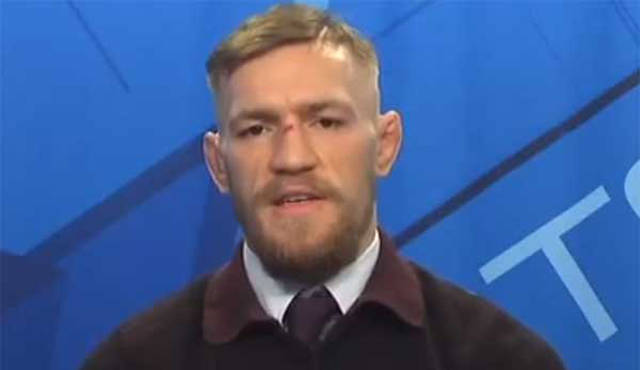mma / Columns
Whatever Happened to Conor McGregor?
 Image Credit: ESPN
Image Credit: ESPN
About five years back there was a fighter rising as fast as he could climb. He was charismatic, enigmatic at times, and above all he was good. His swagger was Ric Flair-like and he spoke with tremendous confidence, invoking unbelievable claims about his fighting ability. You know those groups that claim they found evidence of Bigfoot to promote some awful television show on the History Channel or some other terrible cable outlet? This was Bigfoot going out into the media insisting he was Bigfoot, and then it took the performance of several feats of strength to believe him, for earlier pretenders—admittedly bearing less resemblance to the creature—had already claimed themselves as Bigfoot. When it started to look like it was true—this guy is who he says he is—it was huge.
Everybody in the featherweight division in 2014 and 2015 wanted to fight Conor McGregor. At first, he was the guy getting all the attention that had proven the least. Until he fought Dustin Poirier, he’d never fought a top-level featherweight. After that it was that he hadn’t fought a wrestler. Fighters yearned to raise their profile by derailing this great pretender. And then he beat Chad Mendes, a bad matchup in theory, on short notice with a knee injury. He was for real, but he wasn’t the king. That was Jose Aldo’s crown. Then he took the crown and whacked Aldo on the chin with it in 13 seconds.
This brought about a new period of everyone wanting to fight Conor McGregor. It started at featherweight, then spread to lightweight, and it reached welterweight when he agreed to fight Nate Diaz on short notice at that weight. Now he was the money fight. You fought Conor McGregor for the biggest spotlight and payday of your career—McGregor termed it “red panty night”—and everyone was angling for it. Eventually it reached as high as middleweight, where all-time great Anderson Silva and McGregor spoke of their mutual interest in a bout.
These McGregor glory days, when he was the center of the sport and every relevant fighter across at least three weight classes was gunning for him, have waned.
Nate Diaz famously called out McGregor in a December 2015 post-fight interview, and that plus some luck helped land him two fights with McGregor in 2016. Diaz would have valid reasons to search for a third fight with McGregor, but instead he called out Jorge Masvidal after winning his UFC return bout in August.
Khabib Nurmagomedov had a bitter years-long feud with McGregor that peaked last year with the most lucrative bout in MMA history. Usually fighters will happily go back to that well, particularly when Nurmagomedov had no serious issues beating McGregor last year, but after defending his title on September 7, he expressed no interest in a rematch at this time.
Saturday night, Justin Gaethje scored his third-straight first round knockout, making him McGregor’s most likely next opponent if he returns soon, and providing him a platform to call for the fight. Instead he brushed it off, asking for the winner of an expected Nurmagomedov vs. Tony Ferguson title fight.
This isn’t to say that these fighters would turn down a fight with McGregor if they received a fair money offer, perhaps excepting Nurmagomedov. But after five years, McGregor is no longer the destination fight. Although he’s still the biggest box office attraction in the sport, there’s McGregor fatigue in MMA.
A lot of it is the troubling out-of-cage behavior. It’s less “Where in the world is Conor McGregor?” than “What bad thing is Conor McGregor doing now?” There he was jumping into the cage at a Bellator event. Later he flew to Brooklyn specifically to attack Nurmagomedov, but ended up fighting a bus. He was arrested in Miami for an incident with a fan. At a bar, he punched a patron that refused a shot of his whiskey. Most seriously, The New York Times reported in March that he was being investigated in Ireland for a sexual assault allegation.
All of this is to say that there has been so much negative conversation about McGregor outside of fighting, and no positive movements for him inside the fighting world, that he’s started to be excluded from the conversation in the fighting world. He rose as a fighter that felt he was better than the rest and let it be known, and he’s slipped as this attitude has manifested itself outside of the cage in terrible ways.
This November will mark three years since Conor McGregor’s last victory. That win, over Eddie Alvarez, marks McGregor’s only win in the UFC as a lightweight. He’s currently the third-ranked contender in UFC’s lightweight division, but he’s unlikely to hold that spot much longer without more activity. This is an ever-changing sport, and since that 2016 win over Alvarez, several top lightweights have raised their game.
The clock is ticking. McGregor is 31 and his best days may not be ahead of him, but he can still be the center of the division. It’s about causing tension—not trouble—and winning fights. Whether he can still be that guy, particularly when fighting at the highest level of the lightweight division, is unclear. In his case, cleaning up outside the cage is just as important of cleaning up inside of it.
Thank you for reading. After almost 11 years, this is my last column at 411. Thanks to everyone I’ve worked with over that time and everyone that’s read my work. You can reach me by email at [email protected] and follow me on Twitter @Dan_Plunkett.







